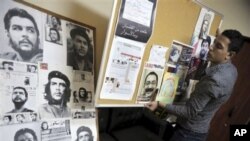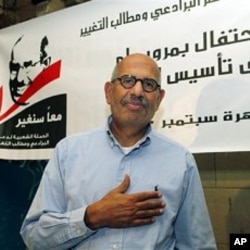Egypt's opposition forces are gearing up to take on the ruling National Democratic Party in parliamentary elections next month. But as the time nears, their ability to get their message across is increasingly curtailed.
The latest wave of Egyptian media restrictions targeted satellite channels. The government-owned NileSat company suspended the licenses of 12 channels this week on charges including incitement of religious hatred and unfounded medical advice.
But following hard on an order curbing live television broadcasts, the firing of a leading dissident journalist, and limits on mass text messaging, the move has many in Egypt making a link to elections.
Egyptians enjoy a nominally freer media than many of their Arab neighbors. But the director of the independent Egyptian Organization for Human Rights, Tarek Zaghloul, argues that during elections, that freedom ends if the media threaten to expose violations of the electoral process.
Zaghloul notes that during Shura Council elections in June, some satellite channels' film crews were banned from covering polling stations where they might have documented fraud. He adds that, as an extra measure, authorities criticized the channels for reporting the crews had been banned.
The human rights advocate says that the media, in theory, are also expected to play the important role of providing equal time for candidates and their campaigns. That, too, is getting harder.
The outspoken editor of al-Doustor newspaper, Ibrahim Issa, was fired earlier this month for trying to publish an opinion piece by opposition figure Mohamed ElBaradei. At the same time, Issa's public affairs television program, Baladna bel Masry, was canceled. Although both his former employers are not government-owned, Issa and others believe they came under government pressure.
The government maintains that the press enjoys wide freedoms, and many pro-government media groups agree. But as ElBaradei has found out, those freedoms include publishing questionable information about opposition politicians and those around them.
Independent political activist Ahmad Salah says ElBaradei, the popular former head of the U.N. nuclear agency serves as an example, if a slightly special one.
"Dr. ElBaradei is someone that is difficult to smear," he said. "So now they are trying to attack him through making him seem unreligious, that his daughter is - I do not know what, because they cannot attack him directly."
Pro-government media were quick to pick up on photographs of ElBaradei's daughter wearing a bikini, a suggestion of impiety in a society where women increasingly don the veil.
Some smears are subtle. One prominent female journalist was photographed at a Western embassy party playing with a dog, an animal many Muslims consider unclean. The accompanying article managed to insinuate questions about her loyalty, religion and sexual proclivities.
Other attempts show less sophistication. The author of an article accusing Ghad party chief Ayman Nour of serving with U.S. forces in Vietnam failed to consider the math. Nour was 10-years old when the war ended.
The opposition tries to counter such broadsides in the less restricted world of the Internet. ElBaradei posted his opinion piece online. Social media are also employed, but according to activist Salah, they are not used widely enough to make a profound difference.
"Facebook is not our tool really to reach out for the people," said Salah. "Facebook is a good tool for us to communicate with our members and also to try to get more membership or friends of the movement through the internet among the young people. But to reach the people really we have to get to the streets."
The public square as a forum for the opposition presents a different set of problems. Egypt is under emergency law and even someone like Salah, jailed for political activities in the past, does not push when it comes to discussing the law's enforcer.
"I have to apologize," he said. "If I talk about the army I will be put in a military tribunal because it is strictly forbidden to talk about the army in Egypt and if you do you will face a military court."
In a country where the military is considered key to the government's decades-long rule, removing it from public discourse may be the most effective form of censorship available.





